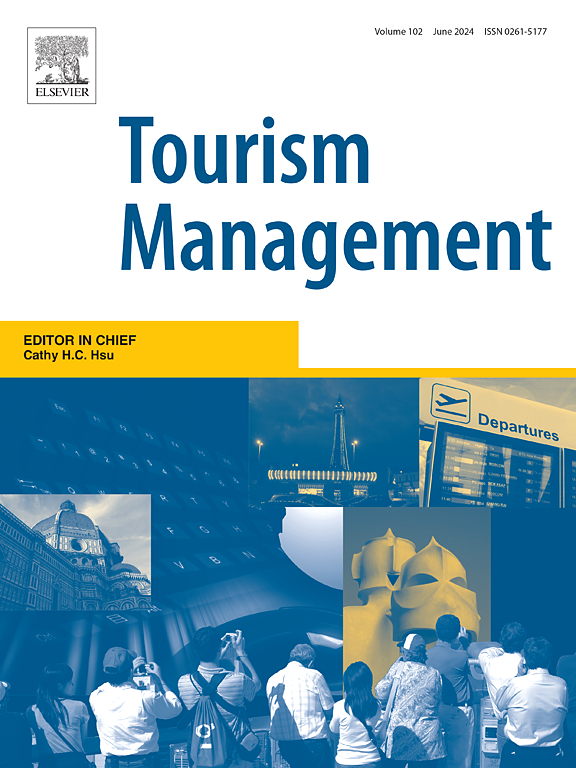了解目的地信息茧与旅游态度和意向的两极分化:旅游体验如何减少偏见?
IF 10.9
1区 管理学
Q1 ENVIRONMENTAL STUDIES
引用次数: 0
摘要
对于贸易战等大规模冲突事件所引发的两极分化态度,现有研究相对较少涉及。事实证明,突出单边信息的 "信息茧 "会放大两极分化的观点和行为。本文旨在通过四项相互关联的研究,将混合方法与社会认同、系统合理性和认知失调理论相结合,以了解冲突事件和随后的信息茧对游客决策的影响。研究 1 采用弹性网合成控制法,比较中国游客赴美旅游的实际情况和没有贸易战的预测反事实情况。研究 2 至研究 5 分别以 300、423、517 和 201 名受访者为对象,考察了游客对贸易战相关目的地信息茧的竞争性推理和接近-回避倾向。研究结果加深了我们对信息茧如何放大两极化思维和行为的理解,而前往冲突国家的旅行经历可以部分缓解这种两极化思维和行为。本文章由计算机程序翻译,如有差异,请以英文原文为准。
Understanding destination information cocoons and polarization of travel attitude and intention: How can travel experiences mitigate bias?
Extant research remains relatively silent on the polarizing attitudes stemming from large-scale conflict events, such as trade wars. Information cocoons, which highlight unilateral information, have been shown to amplify polarized opinions and behaviors. This paper aims to integrate mixed methods with social identity, system justification, and cognitive dissonance theories across four interrelated studies to understand the impact of conflict events and subsequent information cocoons on tourist decision-making. Study 1 leverages the elastic net synthetic control method to compare the actual Chinese tourist travel to the US with a predicted counterfactual scenario without the trade war. Studies 2 through 5, with 300, 423, 517, and 201 respondents respectively, examined tourists’ competing reasonings and approach-avoidance tendencies regarding information cocoons about destinations involved in the trade war. The findings deepen our understanding of how information cocoons amplify polarized thinking and behaviors, which can be partially mitigated by travel experiences to conflicting countries.
求助全文
通过发布文献求助,成功后即可免费获取论文全文。
去求助
来源期刊

Tourism Management
Multiple-
CiteScore
24.10
自引率
7.90%
发文量
190
审稿时长
45 days
期刊介绍:
Tourism Management, the preeminent scholarly journal, concentrates on the comprehensive management aspects, encompassing planning and policy, within the realm of travel and tourism. Adopting an interdisciplinary perspective, the journal delves into international, national, and regional tourism, addressing various management challenges. Its content mirrors this integrative approach, featuring primary research articles, progress in tourism research, case studies, research notes, discussions on current issues, and book reviews. Emphasizing scholarly rigor, all published papers are expected to contribute to theoretical and/or methodological advancements while offering specific insights relevant to tourism management and policy.
 求助内容:
求助内容: 应助结果提醒方式:
应助结果提醒方式:


